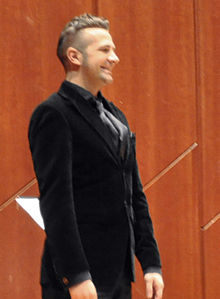Max Emanuel Cencic
| Max Emanuel Cencic | |
|---|---|
 |
|
| Background information | |
| Born |
September 21, 1976 Zagreb, SR Croatia |
| Years active | 1992–present |
| Website | http://www.cencic.com |
Max Emanuel Cenčić (born September 21, 1976) is a countertenor, currently based in Austria.
Born in Zagreb, Cenčić started singing at a very early age, earning fame in his native Croatia at the age of six after singing the Queen of the Night's coloratura showpiece aria 'Der Hölle Rache' from Mozart's Die Zauberflöte on Zagreb television. From circa 1987 to 1992, Cenčić was a member of the Wiener Sängerknaben, with which institution he toured and recorded widely. Recorded performances (in which Cenčić was either treble soloist of the Sängerknaben or an independent male soprano) with the Sängerknaben include Händel's Messiah, Haydn's Die Schöpfung, and Mozart's Requiem (which also features countertenor Derek Lee Ragin), all available on the Capriccio label. Cenčić can also be heard in his capacity as the leading treble soloist with the Wiener Sängerknaben in numerous recordings of liturgical and secular music on the Philips label. A particular highlight from his recordings with the Sängerknaben is a performance of the vocal version of Johann Strauss II's Frühlingsstimmen, a remarkable feat of vocalism for a boy soprano.
From 1992 to 1997, he pursued a solo career, singing soprano although his voice had already broken. Following considerable success as a male soprano (including widely acclaimed performances as Amore in Gluck's Orfeo ed Euridice), he took a sabbatical from singing, during which time he re-trained his voice as a high countertenor. He made his debut as a countertenor in 2001. Prior to adapting his vocal technique to the countertenor range, Cenčić made a series of recordings of operatic arias and Lieder for a private record label. These recordings have been sporadically available through Arcadia, the online shop of the Wiener Staatsoper.
...
Wikipedia
